Organisational Behaviour Report: 4com plc Analysis and Strategies
VerifiedAdded on 2020/12/09
|13
|4164
|484
Report
AI Summary
This report delves into the intricacies of organisational behaviour, using 4com plc as a case study. It explores the influence of organisational culture, power dynamics, and political behaviour on individual and team performance, referencing Handy's typology and Hofstede's cultural theory. The report then evaluates content and process theories of motivation, specifically Herzberg's two-factor theory and equity theory, to assess how motivational techniques can help 4com plc achieve its goals. Furthermore, it examines the characteristics of effective versus ineffective teams, including different team types and their impact on organizational success. The analysis provides recommendations for 4com plc to improve its organisational culture, employee motivation, and team performance, ultimately aiming to enhance overall organisational effectiveness.
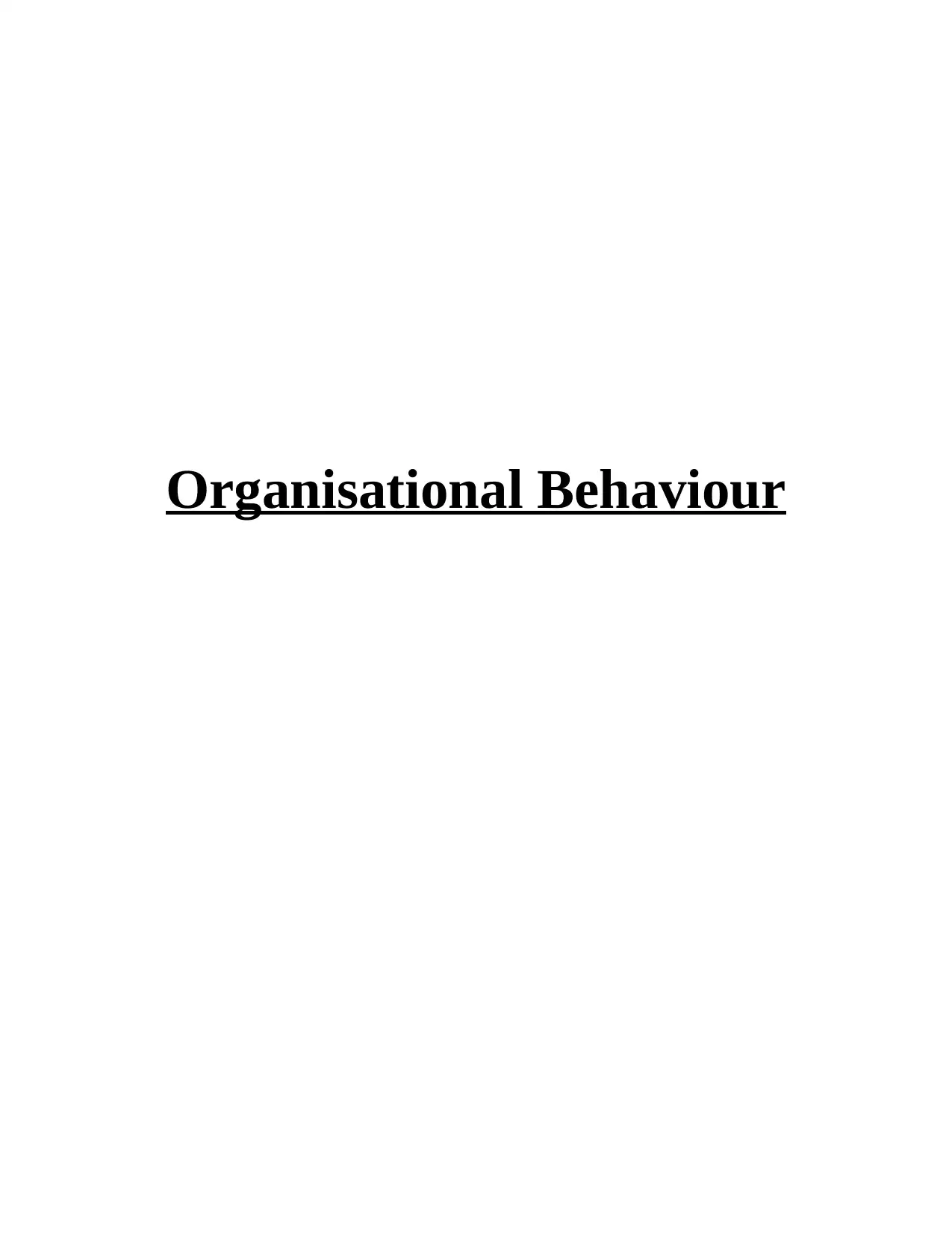
Organisational Behaviour
Paraphrase This Document
Need a fresh take? Get an instant paraphrase of this document with our AI Paraphraser
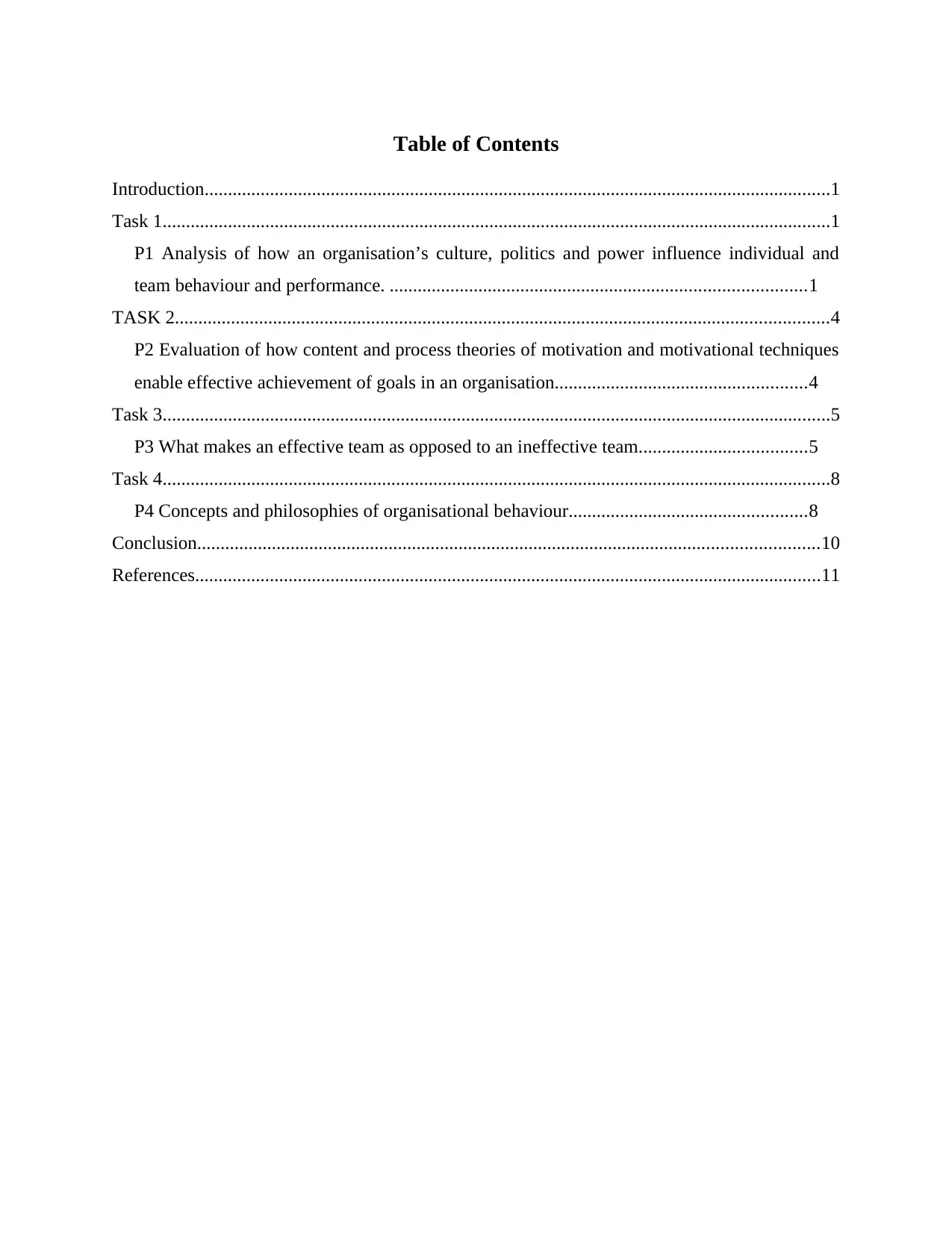
Table of Contents
Introduction......................................................................................................................................1
Task 1...............................................................................................................................................1
P1 Analysis of how an organisation’s culture, politics and power influence individual and
team behaviour and performance. .........................................................................................1
TASK 2............................................................................................................................................4
P2 Evaluation of how content and process theories of motivation and motivational techniques
enable effective achievement of goals in an organisation......................................................4
Task 3...............................................................................................................................................5
P3 What makes an effective team as opposed to an ineffective team....................................5
Task 4...............................................................................................................................................8
P4 Concepts and philosophies of organisational behaviour...................................................8
Conclusion.....................................................................................................................................10
References......................................................................................................................................11
Introduction......................................................................................................................................1
Task 1...............................................................................................................................................1
P1 Analysis of how an organisation’s culture, politics and power influence individual and
team behaviour and performance. .........................................................................................1
TASK 2............................................................................................................................................4
P2 Evaluation of how content and process theories of motivation and motivational techniques
enable effective achievement of goals in an organisation......................................................4
Task 3...............................................................................................................................................5
P3 What makes an effective team as opposed to an ineffective team....................................5
Task 4...............................................................................................................................................8
P4 Concepts and philosophies of organisational behaviour...................................................8
Conclusion.....................................................................................................................................10
References......................................................................................................................................11
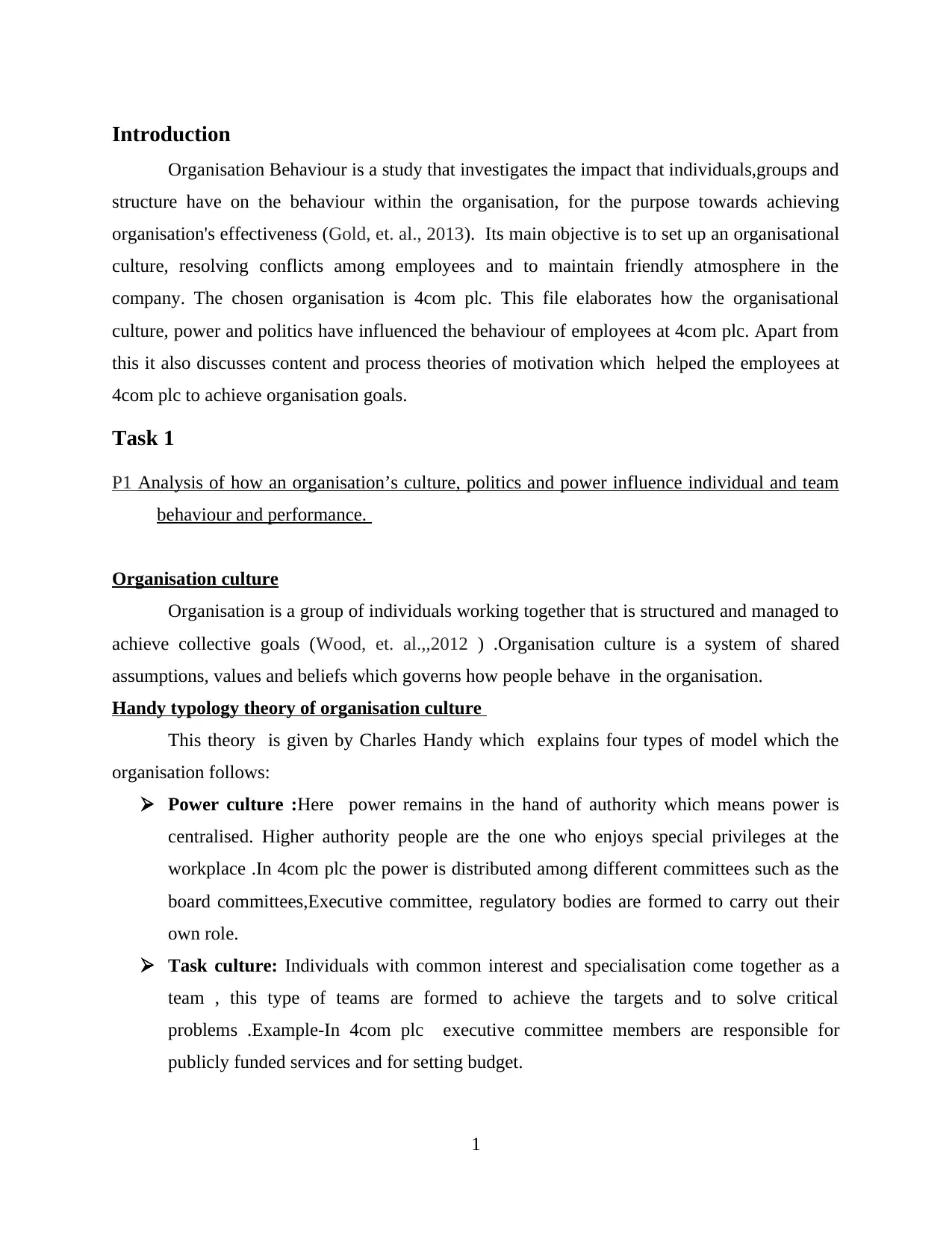
Introduction
Organisation Behaviour is a study that investigates the impact that individuals,groups and
structure have on the behaviour within the organisation, for the purpose towards achieving
organisation's effectiveness (Gold, et. al., 2013). Its main objective is to set up an organisational
culture, resolving conflicts among employees and to maintain friendly atmosphere in the
company. The chosen organisation is 4com plc. This file elaborates how the organisational
culture, power and politics have influenced the behaviour of employees at 4com plc. Apart from
this it also discusses content and process theories of motivation which helped the employees at
4com plc to achieve organisation goals.
Task 1
P1 Analysis of how an organisation’s culture, politics and power influence individual and team
behaviour and performance.
Organisation culture
Organisation is a group of individuals working together that is structured and managed to
achieve collective goals (Wood, et. al.,,2012 ) .Organisation culture is a system of shared
assumptions, values and beliefs which governs how people behave in the organisation.
Handy typology theory of organisation culture
This theory is given by Charles Handy which explains four types of model which the
organisation follows:
Power culture :Here power remains in the hand of authority which means power is
centralised. Higher authority people are the one who enjoys special privileges at the
workplace .In 4com plc the power is distributed among different committees such as the
board committees,Executive committee, regulatory bodies are formed to carry out their
own role.
Task culture: Individuals with common interest and specialisation come together as a
team , this type of teams are formed to achieve the targets and to solve critical
problems .Example-In 4com plc executive committee members are responsible for
publicly funded services and for setting budget.
1
Organisation Behaviour is a study that investigates the impact that individuals,groups and
structure have on the behaviour within the organisation, for the purpose towards achieving
organisation's effectiveness (Gold, et. al., 2013). Its main objective is to set up an organisational
culture, resolving conflicts among employees and to maintain friendly atmosphere in the
company. The chosen organisation is 4com plc. This file elaborates how the organisational
culture, power and politics have influenced the behaviour of employees at 4com plc. Apart from
this it also discusses content and process theories of motivation which helped the employees at
4com plc to achieve organisation goals.
Task 1
P1 Analysis of how an organisation’s culture, politics and power influence individual and team
behaviour and performance.
Organisation culture
Organisation is a group of individuals working together that is structured and managed to
achieve collective goals (Wood, et. al.,,2012 ) .Organisation culture is a system of shared
assumptions, values and beliefs which governs how people behave in the organisation.
Handy typology theory of organisation culture
This theory is given by Charles Handy which explains four types of model which the
organisation follows:
Power culture :Here power remains in the hand of authority which means power is
centralised. Higher authority people are the one who enjoys special privileges at the
workplace .In 4com plc the power is distributed among different committees such as the
board committees,Executive committee, regulatory bodies are formed to carry out their
own role.
Task culture: Individuals with common interest and specialisation come together as a
team , this type of teams are formed to achieve the targets and to solve critical
problems .Example-In 4com plc executive committee members are responsible for
publicly funded services and for setting budget.
1
⊘ This is a preview!⊘
Do you want full access?
Subscribe today to unlock all pages.

Trusted by 1+ million students worldwide
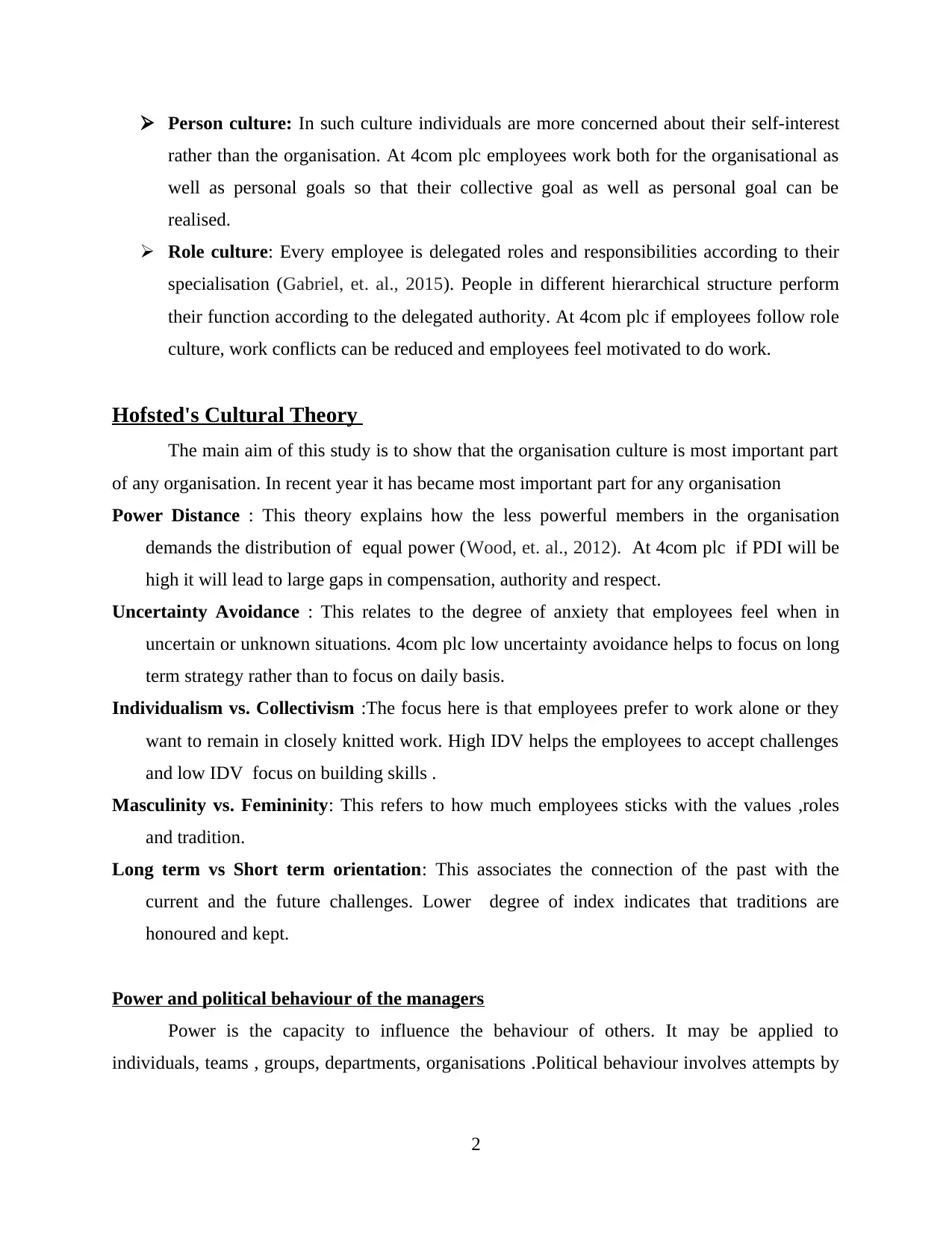
Person culture: In such culture individuals are more concerned about their self-interest
rather than the organisation. At 4com plc employees work both for the organisational as
well as personal goals so that their collective goal as well as personal goal can be
realised.
Role culture: Every employee is delegated roles and responsibilities according to their
specialisation (Gabriel, et. al., 2015). People in different hierarchical structure perform
their function according to the delegated authority. At 4com plc if employees follow role
culture, work conflicts can be reduced and employees feel motivated to do work.
Hofsted's Cultural Theory
The main aim of this study is to show that the organisation culture is most important part
of any organisation. In recent year it has became most important part for any organisation
Power Distance : This theory explains how the less powerful members in the organisation
demands the distribution of equal power (Wood, et. al., 2012). At 4com plc if PDI will be
high it will lead to large gaps in compensation, authority and respect.
Uncertainty Avoidance : This relates to the degree of anxiety that employees feel when in
uncertain or unknown situations. 4com plc low uncertainty avoidance helps to focus on long
term strategy rather than to focus on daily basis.
Individualism vs. Collectivism :The focus here is that employees prefer to work alone or they
want to remain in closely knitted work. High IDV helps the employees to accept challenges
and low IDV focus on building skills .
Masculinity vs. Femininity: This refers to how much employees sticks with the values ,roles
and tradition.
Long term vs Short term orientation: This associates the connection of the past with the
current and the future challenges. Lower degree of index indicates that traditions are
honoured and kept.
Power and political behaviour of the managers
Power is the capacity to influence the behaviour of others. It may be applied to
individuals, teams , groups, departments, organisations .Political behaviour involves attempts by
2
rather than the organisation. At 4com plc employees work both for the organisational as
well as personal goals so that their collective goal as well as personal goal can be
realised.
Role culture: Every employee is delegated roles and responsibilities according to their
specialisation (Gabriel, et. al., 2015). People in different hierarchical structure perform
their function according to the delegated authority. At 4com plc if employees follow role
culture, work conflicts can be reduced and employees feel motivated to do work.
Hofsted's Cultural Theory
The main aim of this study is to show that the organisation culture is most important part
of any organisation. In recent year it has became most important part for any organisation
Power Distance : This theory explains how the less powerful members in the organisation
demands the distribution of equal power (Wood, et. al., 2012). At 4com plc if PDI will be
high it will lead to large gaps in compensation, authority and respect.
Uncertainty Avoidance : This relates to the degree of anxiety that employees feel when in
uncertain or unknown situations. 4com plc low uncertainty avoidance helps to focus on long
term strategy rather than to focus on daily basis.
Individualism vs. Collectivism :The focus here is that employees prefer to work alone or they
want to remain in closely knitted work. High IDV helps the employees to accept challenges
and low IDV focus on building skills .
Masculinity vs. Femininity: This refers to how much employees sticks with the values ,roles
and tradition.
Long term vs Short term orientation: This associates the connection of the past with the
current and the future challenges. Lower degree of index indicates that traditions are
honoured and kept.
Power and political behaviour of the managers
Power is the capacity to influence the behaviour of others. It may be applied to
individuals, teams , groups, departments, organisations .Political behaviour involves attempts by
2
Paraphrase This Document
Need a fresh take? Get an instant paraphrase of this document with our AI Paraphraser
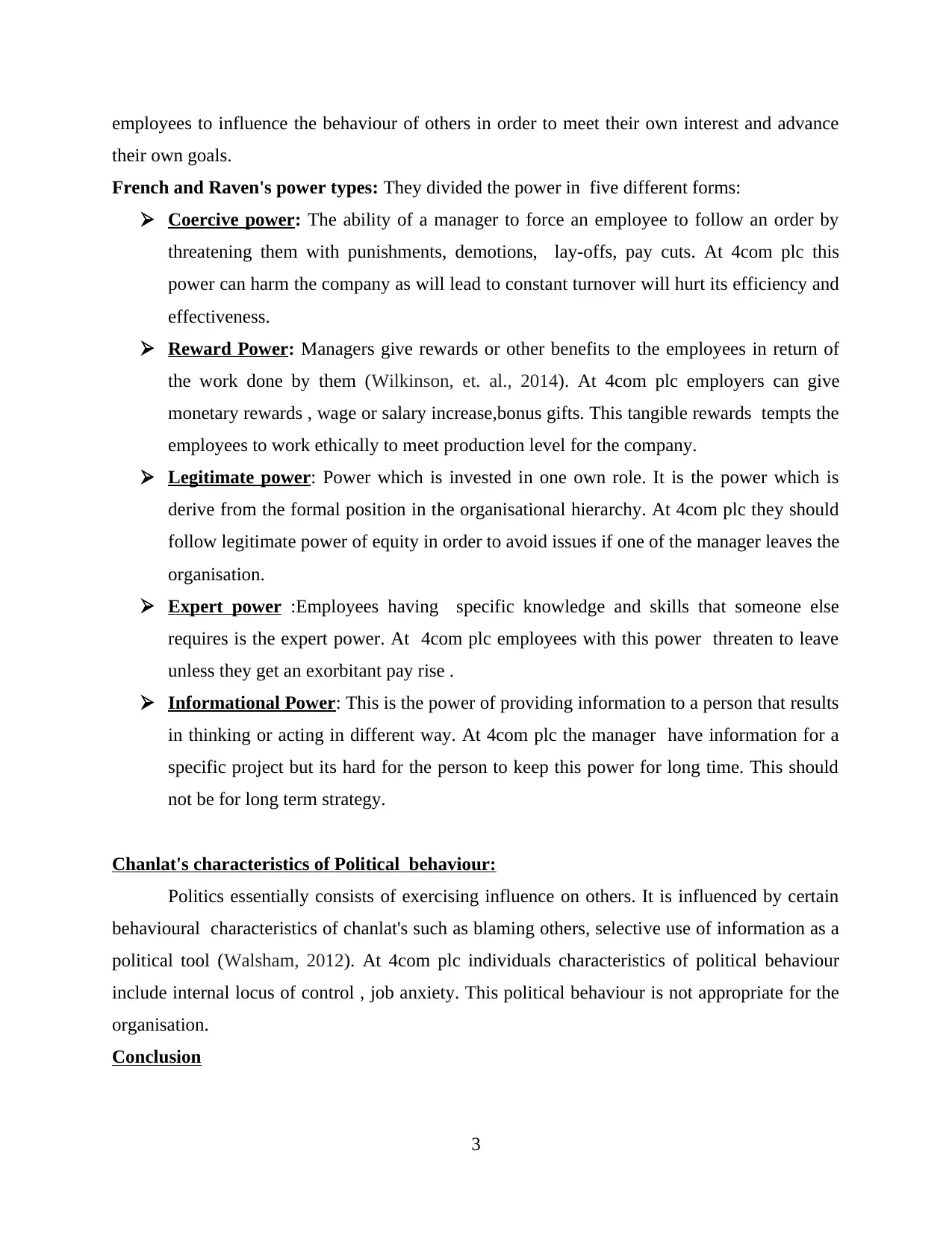
employees to influence the behaviour of others in order to meet their own interest and advance
their own goals.
French and Raven's power types: They divided the power in five different forms:
Coercive power: The ability of a manager to force an employee to follow an order by
threatening them with punishments, demotions, lay-offs, pay cuts. At 4com plc this
power can harm the company as will lead to constant turnover will hurt its efficiency and
effectiveness.
Reward Power: Managers give rewards or other benefits to the employees in return of
the work done by them (Wilkinson, et. al., 2014). At 4com plc employers can give
monetary rewards , wage or salary increase,bonus gifts. This tangible rewards tempts the
employees to work ethically to meet production level for the company.
Legitimate power: Power which is invested in one own role. It is the power which is
derive from the formal position in the organisational hierarchy. At 4com plc they should
follow legitimate power of equity in order to avoid issues if one of the manager leaves the
organisation.
Expert power :Employees having specific knowledge and skills that someone else
requires is the expert power. At 4com plc employees with this power threaten to leave
unless they get an exorbitant pay rise .
Informational Power: This is the power of providing information to a person that results
in thinking or acting in different way. At 4com plc the manager have information for a
specific project but its hard for the person to keep this power for long time. This should
not be for long term strategy.
Chanlat's characteristics of Political behaviour:
Politics essentially consists of exercising influence on others. It is influenced by certain
behavioural characteristics of chanlat's such as blaming others, selective use of information as a
political tool (Walsham, 2012). At 4com plc individuals characteristics of political behaviour
include internal locus of control , job anxiety. This political behaviour is not appropriate for the
organisation.
Conclusion
3
their own goals.
French and Raven's power types: They divided the power in five different forms:
Coercive power: The ability of a manager to force an employee to follow an order by
threatening them with punishments, demotions, lay-offs, pay cuts. At 4com plc this
power can harm the company as will lead to constant turnover will hurt its efficiency and
effectiveness.
Reward Power: Managers give rewards or other benefits to the employees in return of
the work done by them (Wilkinson, et. al., 2014). At 4com plc employers can give
monetary rewards , wage or salary increase,bonus gifts. This tangible rewards tempts the
employees to work ethically to meet production level for the company.
Legitimate power: Power which is invested in one own role. It is the power which is
derive from the formal position in the organisational hierarchy. At 4com plc they should
follow legitimate power of equity in order to avoid issues if one of the manager leaves the
organisation.
Expert power :Employees having specific knowledge and skills that someone else
requires is the expert power. At 4com plc employees with this power threaten to leave
unless they get an exorbitant pay rise .
Informational Power: This is the power of providing information to a person that results
in thinking or acting in different way. At 4com plc the manager have information for a
specific project but its hard for the person to keep this power for long time. This should
not be for long term strategy.
Chanlat's characteristics of Political behaviour:
Politics essentially consists of exercising influence on others. It is influenced by certain
behavioural characteristics of chanlat's such as blaming others, selective use of information as a
political tool (Walsham, 2012). At 4com plc individuals characteristics of political behaviour
include internal locus of control , job anxiety. This political behaviour is not appropriate for the
organisation.
Conclusion
3
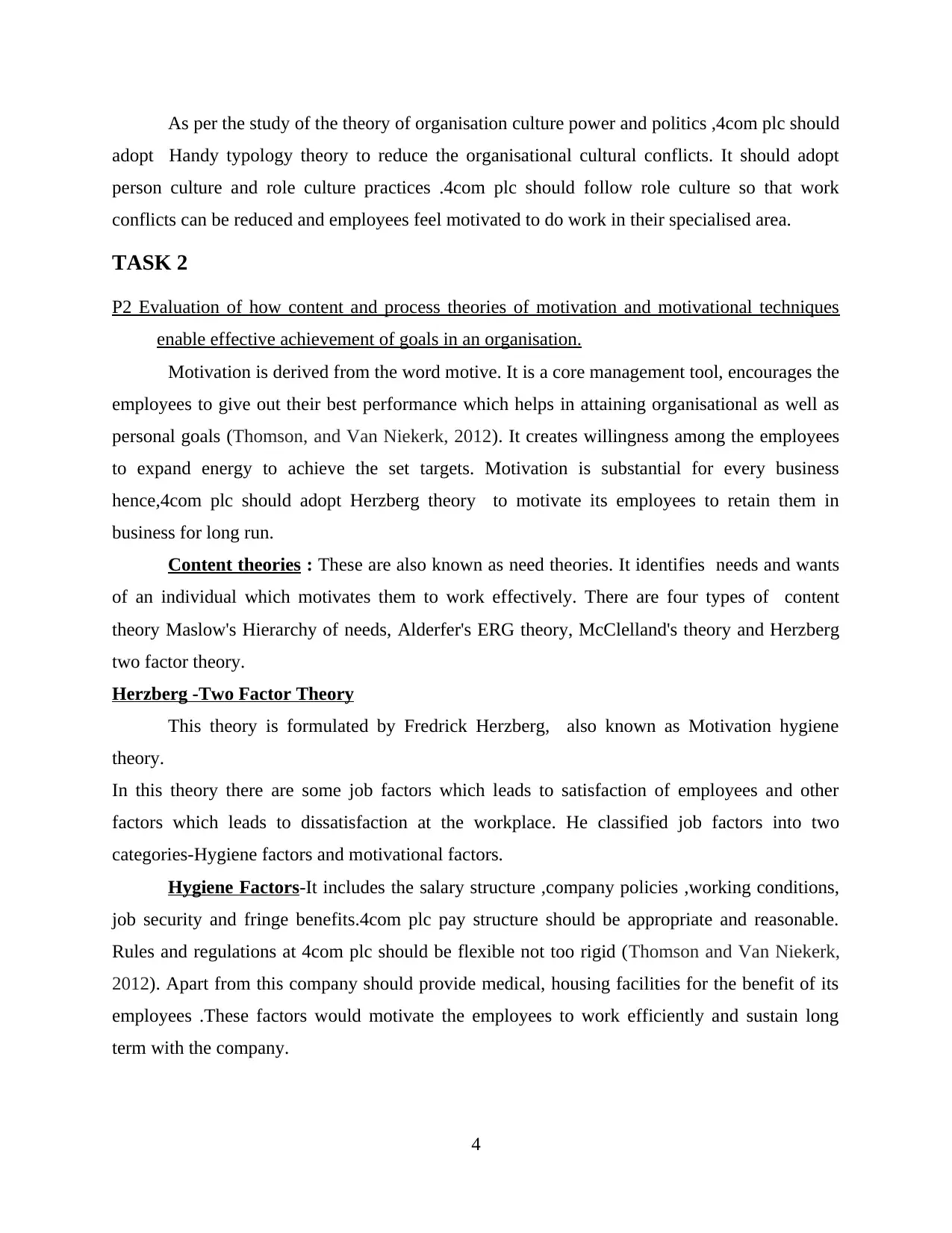
As per the study of the theory of organisation culture power and politics ,4com plc should
adopt Handy typology theory to reduce the organisational cultural conflicts. It should adopt
person culture and role culture practices .4com plc should follow role culture so that work
conflicts can be reduced and employees feel motivated to do work in their specialised area.
TASK 2
P2 Evaluation of how content and process theories of motivation and motivational techniques
enable effective achievement of goals in an organisation.
Motivation is derived from the word motive. It is a core management tool, encourages the
employees to give out their best performance which helps in attaining organisational as well as
personal goals (Thomson, and Van Niekerk, 2012). It creates willingness among the employees
to expand energy to achieve the set targets. Motivation is substantial for every business
hence,4com plc should adopt Herzberg theory to motivate its employees to retain them in
business for long run.
Content theories : These are also known as need theories. It identifies needs and wants
of an individual which motivates them to work effectively. There are four types of content
theory Maslow's Hierarchy of needs, Alderfer's ERG theory, McClelland's theory and Herzberg
two factor theory.
Herzberg -Two Factor Theory
This theory is formulated by Fredrick Herzberg, also known as Motivation hygiene
theory.
In this theory there are some job factors which leads to satisfaction of employees and other
factors which leads to dissatisfaction at the workplace. He classified job factors into two
categories-Hygiene factors and motivational factors.
Hygiene Factors-It includes the salary structure ,company policies ,working conditions,
job security and fringe benefits.4com plc pay structure should be appropriate and reasonable.
Rules and regulations at 4com plc should be flexible not too rigid (Thomson and Van Niekerk,
2012). Apart from this company should provide medical, housing facilities for the benefit of its
employees .These factors would motivate the employees to work efficiently and sustain long
term with the company.
4
adopt Handy typology theory to reduce the organisational cultural conflicts. It should adopt
person culture and role culture practices .4com plc should follow role culture so that work
conflicts can be reduced and employees feel motivated to do work in their specialised area.
TASK 2
P2 Evaluation of how content and process theories of motivation and motivational techniques
enable effective achievement of goals in an organisation.
Motivation is derived from the word motive. It is a core management tool, encourages the
employees to give out their best performance which helps in attaining organisational as well as
personal goals (Thomson, and Van Niekerk, 2012). It creates willingness among the employees
to expand energy to achieve the set targets. Motivation is substantial for every business
hence,4com plc should adopt Herzberg theory to motivate its employees to retain them in
business for long run.
Content theories : These are also known as need theories. It identifies needs and wants
of an individual which motivates them to work effectively. There are four types of content
theory Maslow's Hierarchy of needs, Alderfer's ERG theory, McClelland's theory and Herzberg
two factor theory.
Herzberg -Two Factor Theory
This theory is formulated by Fredrick Herzberg, also known as Motivation hygiene
theory.
In this theory there are some job factors which leads to satisfaction of employees and other
factors which leads to dissatisfaction at the workplace. He classified job factors into two
categories-Hygiene factors and motivational factors.
Hygiene Factors-It includes the salary structure ,company policies ,working conditions,
job security and fringe benefits.4com plc pay structure should be appropriate and reasonable.
Rules and regulations at 4com plc should be flexible not too rigid (Thomson and Van Niekerk,
2012). Apart from this company should provide medical, housing facilities for the benefit of its
employees .These factors would motivate the employees to work efficiently and sustain long
term with the company.
4
⊘ This is a preview!⊘
Do you want full access?
Subscribe today to unlock all pages.

Trusted by 1+ million students worldwide
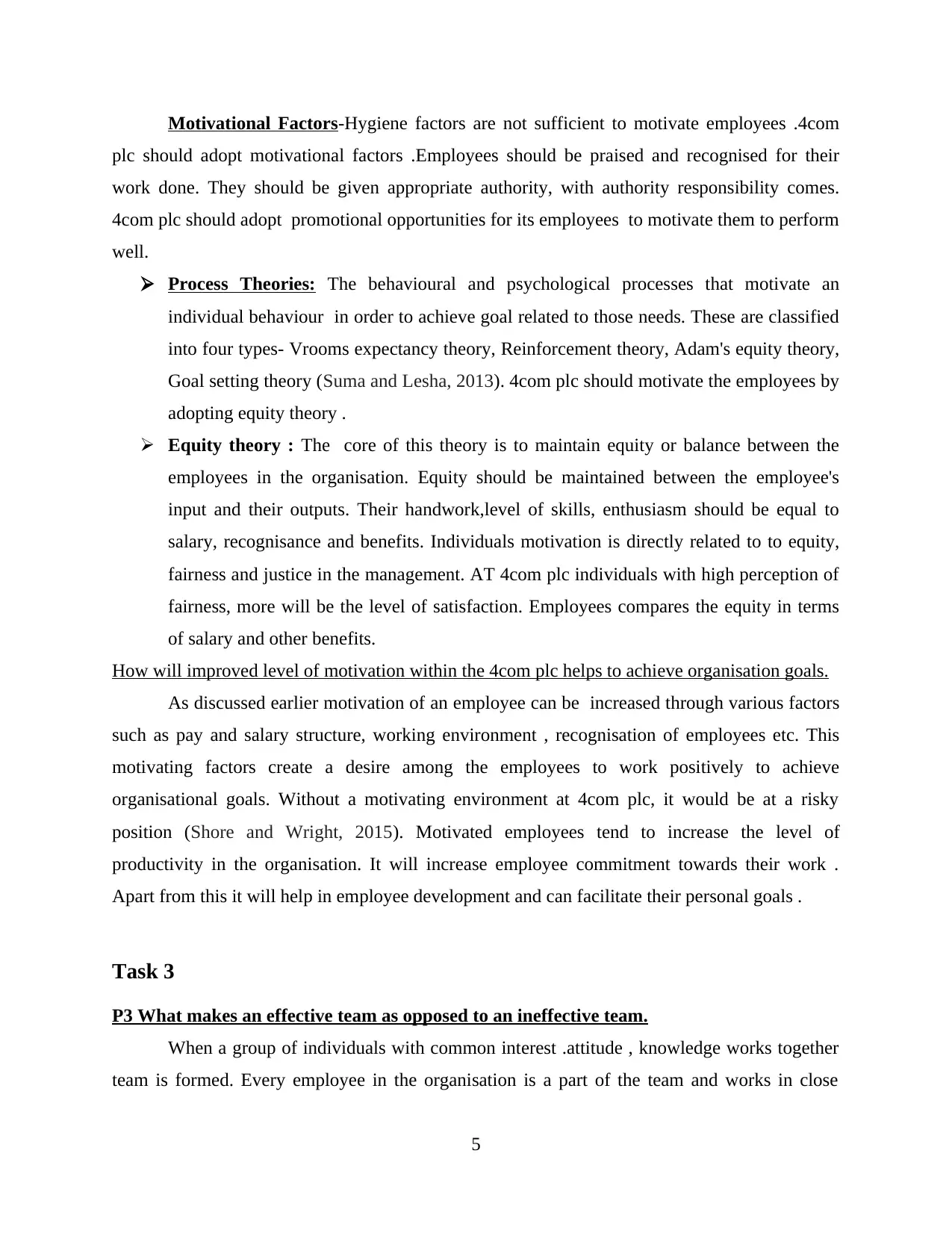
Motivational Factors-Hygiene factors are not sufficient to motivate employees .4com
plc should adopt motivational factors .Employees should be praised and recognised for their
work done. They should be given appropriate authority, with authority responsibility comes.
4com plc should adopt promotional opportunities for its employees to motivate them to perform
well.
Process Theories: The behavioural and psychological processes that motivate an
individual behaviour in order to achieve goal related to those needs. These are classified
into four types- Vrooms expectancy theory, Reinforcement theory, Adam's equity theory,
Goal setting theory (Suma and Lesha, 2013). 4com plc should motivate the employees by
adopting equity theory .
Equity theory : The core of this theory is to maintain equity or balance between the
employees in the organisation. Equity should be maintained between the employee's
input and their outputs. Their handwork,level of skills, enthusiasm should be equal to
salary, recognisance and benefits. Individuals motivation is directly related to to equity,
fairness and justice in the management. AT 4com plc individuals with high perception of
fairness, more will be the level of satisfaction. Employees compares the equity in terms
of salary and other benefits.
How will improved level of motivation within the 4com plc helps to achieve organisation goals.
As discussed earlier motivation of an employee can be increased through various factors
such as pay and salary structure, working environment , recognisation of employees etc. This
motivating factors create a desire among the employees to work positively to achieve
organisational goals. Without a motivating environment at 4com plc, it would be at a risky
position (Shore and Wright, 2015). Motivated employees tend to increase the level of
productivity in the organisation. It will increase employee commitment towards their work .
Apart from this it will help in employee development and can facilitate their personal goals .
Task 3
P3 What makes an effective team as opposed to an ineffective team.
When a group of individuals with common interest .attitude , knowledge works together
team is formed. Every employee in the organisation is a part of the team and works in close
5
plc should adopt motivational factors .Employees should be praised and recognised for their
work done. They should be given appropriate authority, with authority responsibility comes.
4com plc should adopt promotional opportunities for its employees to motivate them to perform
well.
Process Theories: The behavioural and psychological processes that motivate an
individual behaviour in order to achieve goal related to those needs. These are classified
into four types- Vrooms expectancy theory, Reinforcement theory, Adam's equity theory,
Goal setting theory (Suma and Lesha, 2013). 4com plc should motivate the employees by
adopting equity theory .
Equity theory : The core of this theory is to maintain equity or balance between the
employees in the organisation. Equity should be maintained between the employee's
input and their outputs. Their handwork,level of skills, enthusiasm should be equal to
salary, recognisance and benefits. Individuals motivation is directly related to to equity,
fairness and justice in the management. AT 4com plc individuals with high perception of
fairness, more will be the level of satisfaction. Employees compares the equity in terms
of salary and other benefits.
How will improved level of motivation within the 4com plc helps to achieve organisation goals.
As discussed earlier motivation of an employee can be increased through various factors
such as pay and salary structure, working environment , recognisation of employees etc. This
motivating factors create a desire among the employees to work positively to achieve
organisational goals. Without a motivating environment at 4com plc, it would be at a risky
position (Shore and Wright, 2015). Motivated employees tend to increase the level of
productivity in the organisation. It will increase employee commitment towards their work .
Apart from this it will help in employee development and can facilitate their personal goals .
Task 3
P3 What makes an effective team as opposed to an ineffective team.
When a group of individuals with common interest .attitude , knowledge works together
team is formed. Every employee in the organisation is a part of the team and works in close
5
Paraphrase This Document
Need a fresh take? Get an instant paraphrase of this document with our AI Paraphraser
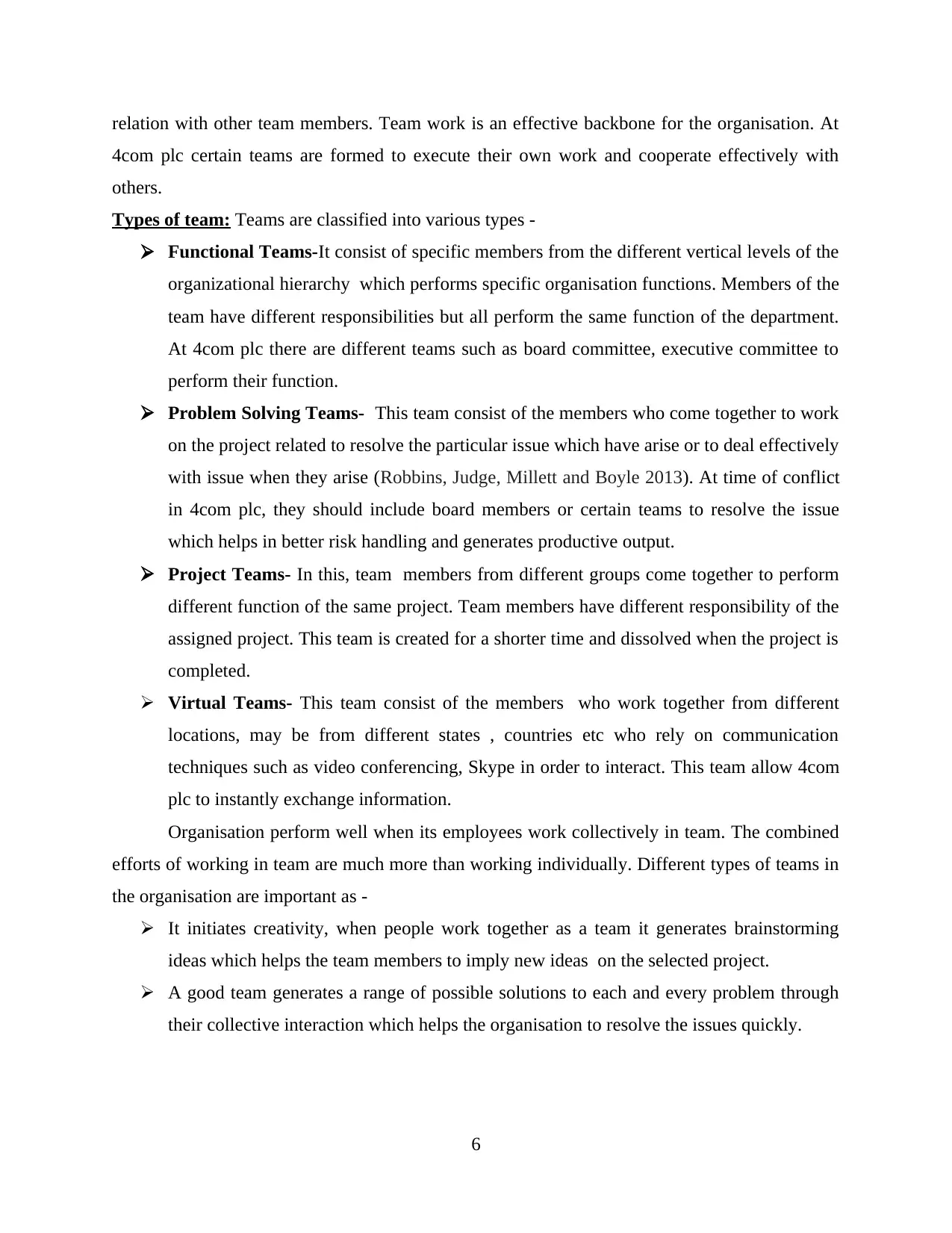
relation with other team members. Team work is an effective backbone for the organisation. At
4com plc certain teams are formed to execute their own work and cooperate effectively with
others.
Types of team: Teams are classified into various types -
Functional Teams-It consist of specific members from the different vertical levels of the
organizational hierarchy which performs specific organisation functions. Members of the
team have different responsibilities but all perform the same function of the department.
At 4com plc there are different teams such as board committee, executive committee to
perform their function.
Problem Solving Teams- This team consist of the members who come together to work
on the project related to resolve the particular issue which have arise or to deal effectively
with issue when they arise (Robbins, Judge, Millett and Boyle 2013). At time of conflict
in 4com plc, they should include board members or certain teams to resolve the issue
which helps in better risk handling and generates productive output.
Project Teams- In this, team members from different groups come together to perform
different function of the same project. Team members have different responsibility of the
assigned project. This team is created for a shorter time and dissolved when the project is
completed.
Virtual Teams- This team consist of the members who work together from different
locations, may be from different states , countries etc who rely on communication
techniques such as video conferencing, Skype in order to interact. This team allow 4com
plc to instantly exchange information.
Organisation perform well when its employees work collectively in team. The combined
efforts of working in team are much more than working individually. Different types of teams in
the organisation are important as -
It initiates creativity, when people work together as a team it generates brainstorming
ideas which helps the team members to imply new ideas on the selected project.
A good team generates a range of possible solutions to each and every problem through
their collective interaction which helps the organisation to resolve the issues quickly.
6
4com plc certain teams are formed to execute their own work and cooperate effectively with
others.
Types of team: Teams are classified into various types -
Functional Teams-It consist of specific members from the different vertical levels of the
organizational hierarchy which performs specific organisation functions. Members of the
team have different responsibilities but all perform the same function of the department.
At 4com plc there are different teams such as board committee, executive committee to
perform their function.
Problem Solving Teams- This team consist of the members who come together to work
on the project related to resolve the particular issue which have arise or to deal effectively
with issue when they arise (Robbins, Judge, Millett and Boyle 2013). At time of conflict
in 4com plc, they should include board members or certain teams to resolve the issue
which helps in better risk handling and generates productive output.
Project Teams- In this, team members from different groups come together to perform
different function of the same project. Team members have different responsibility of the
assigned project. This team is created for a shorter time and dissolved when the project is
completed.
Virtual Teams- This team consist of the members who work together from different
locations, may be from different states , countries etc who rely on communication
techniques such as video conferencing, Skype in order to interact. This team allow 4com
plc to instantly exchange information.
Organisation perform well when its employees work collectively in team. The combined
efforts of working in team are much more than working individually. Different types of teams in
the organisation are important as -
It initiates creativity, when people work together as a team it generates brainstorming
ideas which helps the team members to imply new ideas on the selected project.
A good team generates a range of possible solutions to each and every problem through
their collective interaction which helps the organisation to resolve the issues quickly.
6
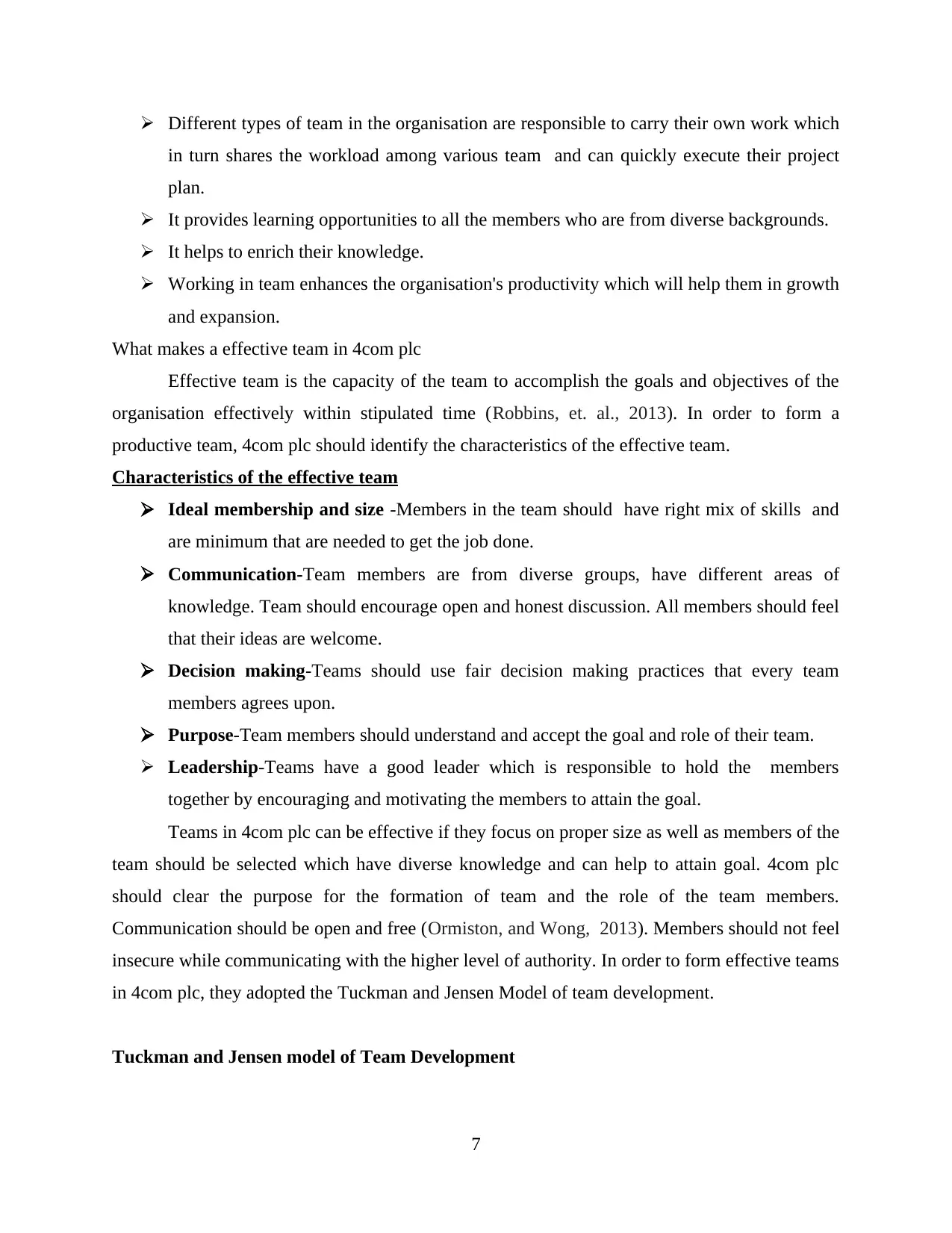
Different types of team in the organisation are responsible to carry their own work which
in turn shares the workload among various team and can quickly execute their project
plan.
It provides learning opportunities to all the members who are from diverse backgrounds.
It helps to enrich their knowledge.
Working in team enhances the organisation's productivity which will help them in growth
and expansion.
What makes a effective team in 4com plc
Effective team is the capacity of the team to accomplish the goals and objectives of the
organisation effectively within stipulated time (Robbins, et. al., 2013). In order to form a
productive team, 4com plc should identify the characteristics of the effective team.
Characteristics of the effective team
Ideal membership and size -Members in the team should have right mix of skills and
are minimum that are needed to get the job done.
Communication-Team members are from diverse groups, have different areas of
knowledge. Team should encourage open and honest discussion. All members should feel
that their ideas are welcome.
Decision making-Teams should use fair decision making practices that every team
members agrees upon.
Purpose-Team members should understand and accept the goal and role of their team.
Leadership-Teams have a good leader which is responsible to hold the members
together by encouraging and motivating the members to attain the goal.
Teams in 4com plc can be effective if they focus on proper size as well as members of the
team should be selected which have diverse knowledge and can help to attain goal. 4com plc
should clear the purpose for the formation of team and the role of the team members.
Communication should be open and free (Ormiston, and Wong, 2013). Members should not feel
insecure while communicating with the higher level of authority. In order to form effective teams
in 4com plc, they adopted the Tuckman and Jensen Model of team development.
Tuckman and Jensen model of Team Development
7
in turn shares the workload among various team and can quickly execute their project
plan.
It provides learning opportunities to all the members who are from diverse backgrounds.
It helps to enrich their knowledge.
Working in team enhances the organisation's productivity which will help them in growth
and expansion.
What makes a effective team in 4com plc
Effective team is the capacity of the team to accomplish the goals and objectives of the
organisation effectively within stipulated time (Robbins, et. al., 2013). In order to form a
productive team, 4com plc should identify the characteristics of the effective team.
Characteristics of the effective team
Ideal membership and size -Members in the team should have right mix of skills and
are minimum that are needed to get the job done.
Communication-Team members are from diverse groups, have different areas of
knowledge. Team should encourage open and honest discussion. All members should feel
that their ideas are welcome.
Decision making-Teams should use fair decision making practices that every team
members agrees upon.
Purpose-Team members should understand and accept the goal and role of their team.
Leadership-Teams have a good leader which is responsible to hold the members
together by encouraging and motivating the members to attain the goal.
Teams in 4com plc can be effective if they focus on proper size as well as members of the
team should be selected which have diverse knowledge and can help to attain goal. 4com plc
should clear the purpose for the formation of team and the role of the team members.
Communication should be open and free (Ormiston, and Wong, 2013). Members should not feel
insecure while communicating with the higher level of authority. In order to form effective teams
in 4com plc, they adopted the Tuckman and Jensen Model of team development.
Tuckman and Jensen model of Team Development
7
⊘ This is a preview!⊘
Do you want full access?
Subscribe today to unlock all pages.

Trusted by 1+ million students worldwide
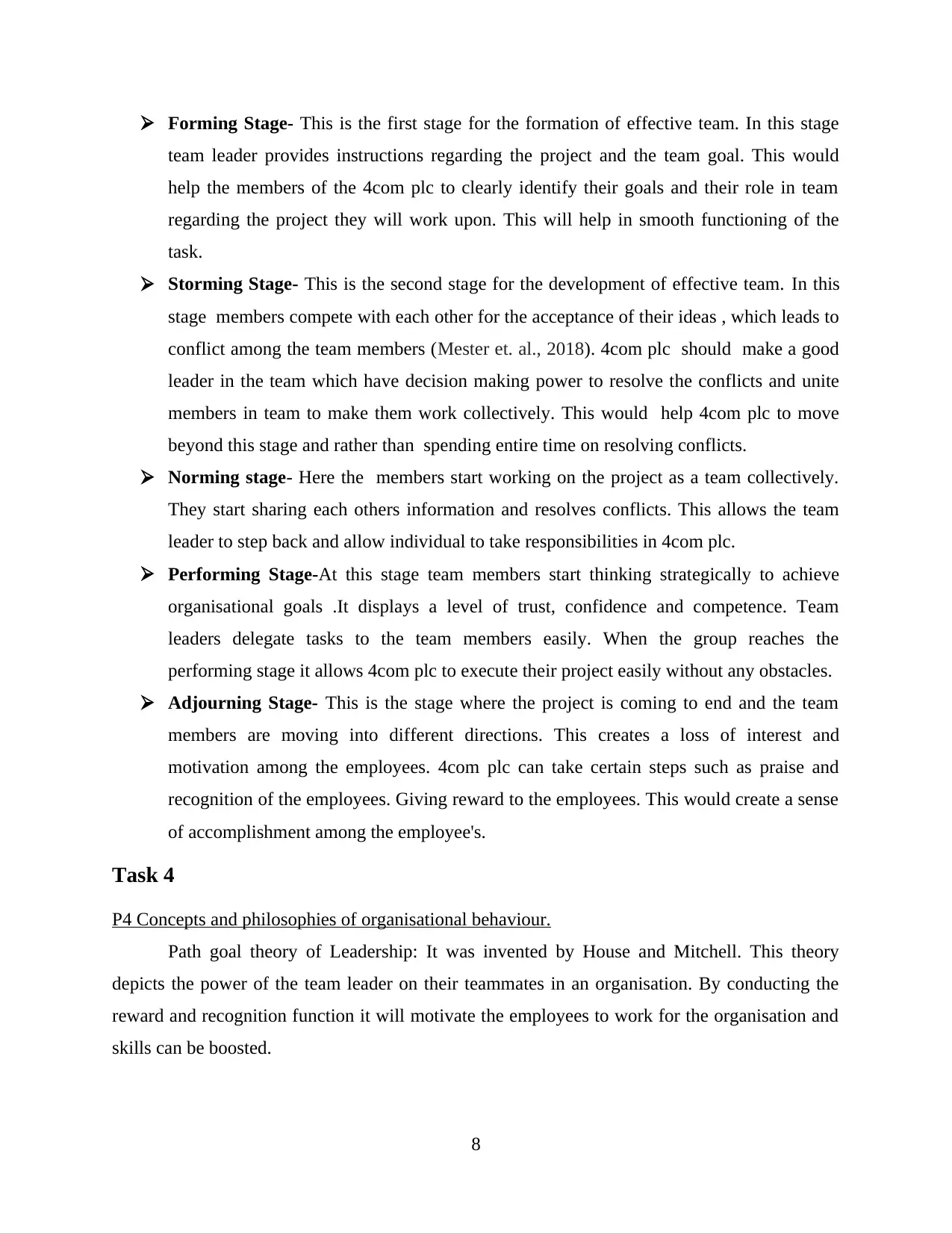
Forming Stage- This is the first stage for the formation of effective team. In this stage
team leader provides instructions regarding the project and the team goal. This would
help the members of the 4com plc to clearly identify their goals and their role in team
regarding the project they will work upon. This will help in smooth functioning of the
task.
Storming Stage- This is the second stage for the development of effective team. In this
stage members compete with each other for the acceptance of their ideas , which leads to
conflict among the team members (Mester et. al., 2018). 4com plc should make a good
leader in the team which have decision making power to resolve the conflicts and unite
members in team to make them work collectively. This would help 4com plc to move
beyond this stage and rather than spending entire time on resolving conflicts.
Norming stage- Here the members start working on the project as a team collectively.
They start sharing each others information and resolves conflicts. This allows the team
leader to step back and allow individual to take responsibilities in 4com plc.
Performing Stage-At this stage team members start thinking strategically to achieve
organisational goals .It displays a level of trust, confidence and competence. Team
leaders delegate tasks to the team members easily. When the group reaches the
performing stage it allows 4com plc to execute their project easily without any obstacles.
Adjourning Stage- This is the stage where the project is coming to end and the team
members are moving into different directions. This creates a loss of interest and
motivation among the employees. 4com plc can take certain steps such as praise and
recognition of the employees. Giving reward to the employees. This would create a sense
of accomplishment among the employee's.
Task 4
P4 Concepts and philosophies of organisational behaviour.
Path goal theory of Leadership: It was invented by House and Mitchell. This theory
depicts the power of the team leader on their teammates in an organisation. By conducting the
reward and recognition function it will motivate the employees to work for the organisation and
skills can be boosted.
8
team leader provides instructions regarding the project and the team goal. This would
help the members of the 4com plc to clearly identify their goals and their role in team
regarding the project they will work upon. This will help in smooth functioning of the
task.
Storming Stage- This is the second stage for the development of effective team. In this
stage members compete with each other for the acceptance of their ideas , which leads to
conflict among the team members (Mester et. al., 2018). 4com plc should make a good
leader in the team which have decision making power to resolve the conflicts and unite
members in team to make them work collectively. This would help 4com plc to move
beyond this stage and rather than spending entire time on resolving conflicts.
Norming stage- Here the members start working on the project as a team collectively.
They start sharing each others information and resolves conflicts. This allows the team
leader to step back and allow individual to take responsibilities in 4com plc.
Performing Stage-At this stage team members start thinking strategically to achieve
organisational goals .It displays a level of trust, confidence and competence. Team
leaders delegate tasks to the team members easily. When the group reaches the
performing stage it allows 4com plc to execute their project easily without any obstacles.
Adjourning Stage- This is the stage where the project is coming to end and the team
members are moving into different directions. This creates a loss of interest and
motivation among the employees. 4com plc can take certain steps such as praise and
recognition of the employees. Giving reward to the employees. This would create a sense
of accomplishment among the employee's.
Task 4
P4 Concepts and philosophies of organisational behaviour.
Path goal theory of Leadership: It was invented by House and Mitchell. This theory
depicts the power of the team leader on their teammates in an organisation. By conducting the
reward and recognition function it will motivate the employees to work for the organisation and
skills can be boosted.
8
Paraphrase This Document
Need a fresh take? Get an instant paraphrase of this document with our AI Paraphraser
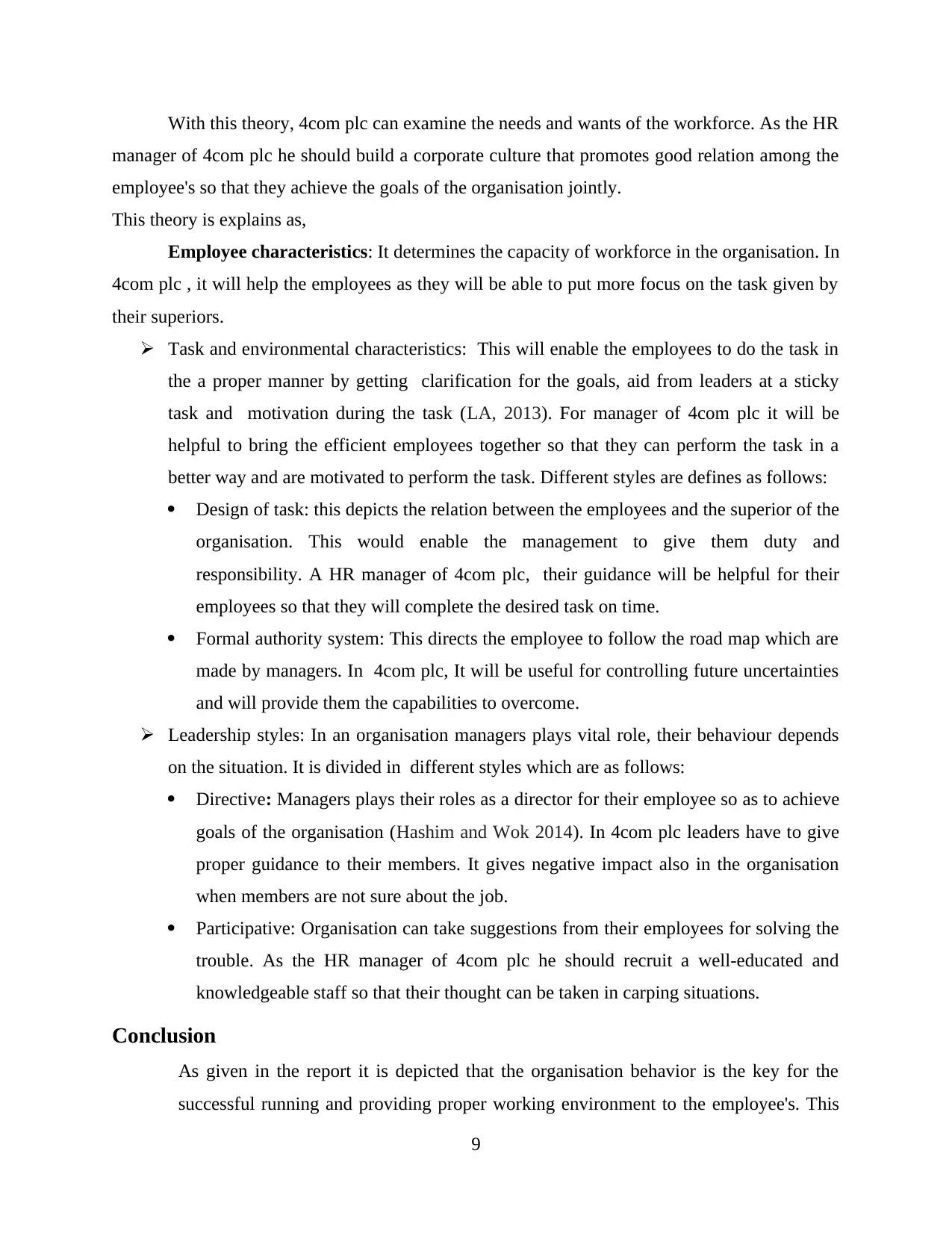
With this theory, 4com plc can examine the needs and wants of the workforce. As the HR
manager of 4com plc he should build a corporate culture that promotes good relation among the
employee's so that they achieve the goals of the organisation jointly.
This theory is explains as,
Employee characteristics: It determines the capacity of workforce in the organisation. In
4com plc , it will help the employees as they will be able to put more focus on the task given by
their superiors.
Task and environmental characteristics: This will enable the employees to do the task in
the a proper manner by getting clarification for the goals, aid from leaders at a sticky
task and motivation during the task (LA, 2013). For manager of 4com plc it will be
helpful to bring the efficient employees together so that they can perform the task in a
better way and are motivated to perform the task. Different styles are defines as follows:
Design of task: this depicts the relation between the employees and the superior of the
organisation. This would enable the management to give them duty and
responsibility. A HR manager of 4com plc, their guidance will be helpful for their
employees so that they will complete the desired task on time.
Formal authority system: This directs the employee to follow the road map which are
made by managers. In 4com plc, It will be useful for controlling future uncertainties
and will provide them the capabilities to overcome.
Leadership styles: In an organisation managers plays vital role, their behaviour depends
on the situation. It is divided in different styles which are as follows:
Directive: Managers plays their roles as a director for their employee so as to achieve
goals of the organisation (Hashim and Wok 2014). In 4com plc leaders have to give
proper guidance to their members. It gives negative impact also in the organisation
when members are not sure about the job.
Participative: Organisation can take suggestions from their employees for solving the
trouble. As the HR manager of 4com plc he should recruit a well-educated and
knowledgeable staff so that their thought can be taken in carping situations.
Conclusion
As given in the report it is depicted that the organisation behavior is the key for the
successful running and providing proper working environment to the employee's. This
9
manager of 4com plc he should build a corporate culture that promotes good relation among the
employee's so that they achieve the goals of the organisation jointly.
This theory is explains as,
Employee characteristics: It determines the capacity of workforce in the organisation. In
4com plc , it will help the employees as they will be able to put more focus on the task given by
their superiors.
Task and environmental characteristics: This will enable the employees to do the task in
the a proper manner by getting clarification for the goals, aid from leaders at a sticky
task and motivation during the task (LA, 2013). For manager of 4com plc it will be
helpful to bring the efficient employees together so that they can perform the task in a
better way and are motivated to perform the task. Different styles are defines as follows:
Design of task: this depicts the relation between the employees and the superior of the
organisation. This would enable the management to give them duty and
responsibility. A HR manager of 4com plc, their guidance will be helpful for their
employees so that they will complete the desired task on time.
Formal authority system: This directs the employee to follow the road map which are
made by managers. In 4com plc, It will be useful for controlling future uncertainties
and will provide them the capabilities to overcome.
Leadership styles: In an organisation managers plays vital role, their behaviour depends
on the situation. It is divided in different styles which are as follows:
Directive: Managers plays their roles as a director for their employee so as to achieve
goals of the organisation (Hashim and Wok 2014). In 4com plc leaders have to give
proper guidance to their members. It gives negative impact also in the organisation
when members are not sure about the job.
Participative: Organisation can take suggestions from their employees for solving the
trouble. As the HR manager of 4com plc he should recruit a well-educated and
knowledgeable staff so that their thought can be taken in carping situations.
Conclusion
As given in the report it is depicted that the organisation behavior is the key for the
successful running and providing proper working environment to the employee's. This
9
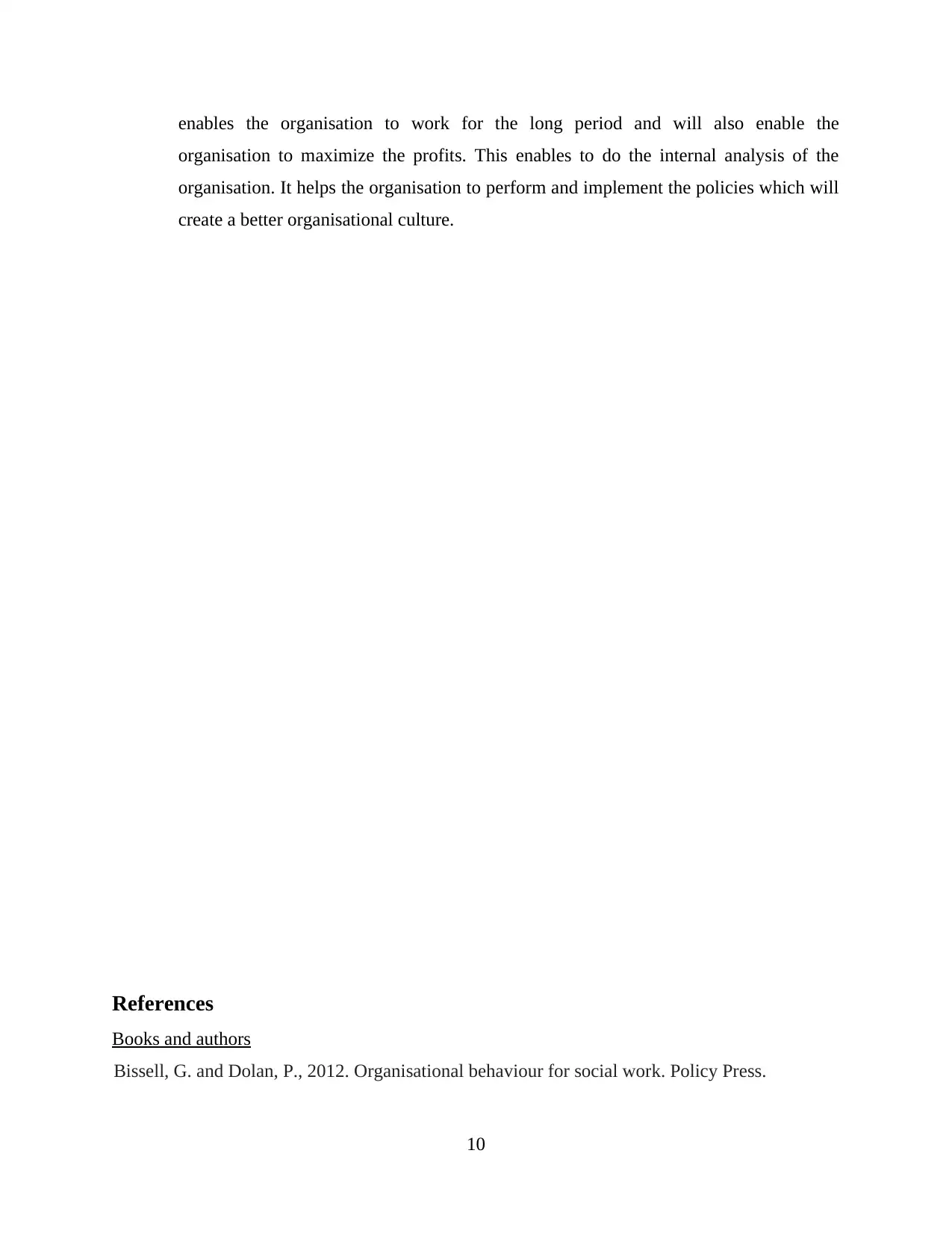
enables the organisation to work for the long period and will also enable the
organisation to maximize the profits. This enables to do the internal analysis of the
organisation. It helps the organisation to perform and implement the policies which will
create a better organisational culture.
References
Books and authors
Bissell, G. and Dolan, P., 2012. Organisational behaviour for social work. Policy Press.
10
organisation to maximize the profits. This enables to do the internal analysis of the
organisation. It helps the organisation to perform and implement the policies which will
create a better organisational culture.
References
Books and authors
Bissell, G. and Dolan, P., 2012. Organisational behaviour for social work. Policy Press.
10
⊘ This is a preview!⊘
Do you want full access?
Subscribe today to unlock all pages.

Trusted by 1+ million students worldwide
1 out of 13
Related Documents
Your All-in-One AI-Powered Toolkit for Academic Success.
+13062052269
info@desklib.com
Available 24*7 on WhatsApp / Email
![[object Object]](/_next/static/media/star-bottom.7253800d.svg)
Unlock your academic potential
Copyright © 2020–2026 A2Z Services. All Rights Reserved. Developed and managed by ZUCOL.





